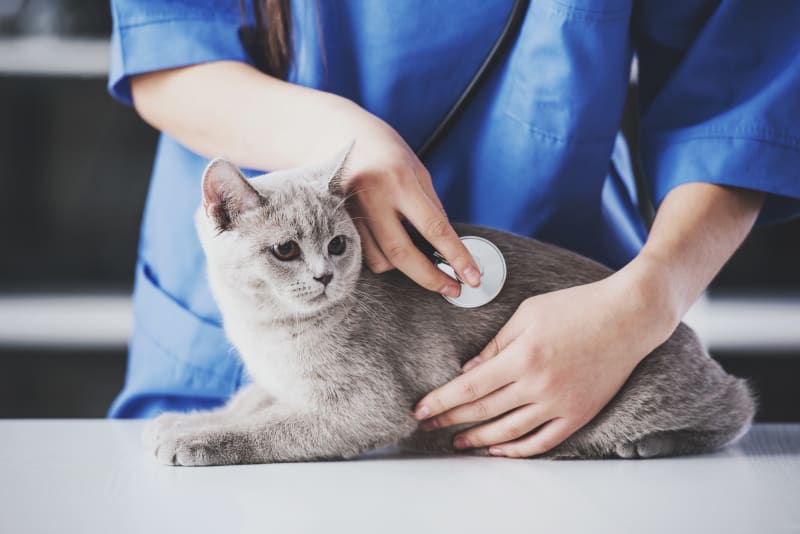Pneumonia in cats is an inflammation of the lungs and airways that can occur for a number of reasons. In today's blog our Bartlett vets explain some of the causes, symptoms and treatments for pneumonia in cats.
What causes pneumonia in cats?
Your cat can contract pneumonia in a number of different ways:
- Infectious pneumonia – Infectious pneumonia results from a viral or bacterial infection in the lungs and airways, this is the most common form of pneumonia seen in cats. If particular bacteria, viruses, or fungal organisms invade the nostrils or trachea of your cat, they could lead to an infection or inflammation which can develop into pneumonia.
- Aspiration pneumonia – Your cat could develop aspiration pneumonia after inhaling a foreign material, which leads to irritation of the sensitive lining of the lungs. A common cause of aspiration pneumonia in cats is the improper administration of liquid medications, or the inhalation of vomit if your cat has been sick.
- Fungal pneumonia (also called mycotic pneumonia) – This form of pneumonia begins as a fungal infection which progresses into the development of pneumonia. Fungal infections are believed to occur when the cat has inhaled spores from the soil.
- Parasites - Cats can fall victim to a number of parasites. In some cases parasites including lungworms and flukes can invade the cat's bronchi and result in pneumonia.
While cats of any age can develop pneumonia, it is most often diagnosed in very young kittens, senior cats, or cats with other underlying health conditions.
How do I know if my cat has pneumonia?
In cats, pneumonia isn't always straight forward to detect since many of the symptoms are also associated with other respiratory infections or cat colds. That said, if your cat is suffering from pneumonia you may notice one or more of the following symptoms:
- Persistent coughing
- Shallow or laboured breathing
- Nasal discharge
- Gurgling or rattling respiratory sounds
- Lack of appetite
- Fever
- Coughing up mucus or blood
- Unusually fast breathing rate
- Weight loss
- Bluish mouth
- Lethargy
- Untidy appearance
If a fungal infection is at the root of your cat's pneumonia you may also notice that your cat has runny eyes, skin lesions, or even lameness, whereas cats suffering from aspiration pneumonia often experience difficulty swallowing, increased heart rate and vomiting.
Is pneumonia contagious to other cats?
Viral or bacterial pneumonia is contagious and can easily be passed along to other cats, dogs, and small animals.
In order to help prevent the spread of the virus or bacteria, our vets recommend keeping your sick cat separated from other pets in your household. When separating your cat from other pets in the home, be sure to provide your sick cat with a comfy place to rest, a fresh clean litter box, and plenty of food and water.
Frequently clean your cat's food and water bowls, as well as their litter box, and toys which may become contaminated. Also, be sure to wash your hands thoroughly after handling your unwell cat.
Will my cat fully recover from pneumonia?
If your cat develops pneumonia, your vet will begin treatment to help stabilize your cat's condition then work on fighting the infection. Depending on the severity of your cat's symptoms treatment for pneumonia may include hospitalization for monitoring, oxygen therapy or a nebulizer treatment to help ease respiratory symptoms, as well as intravenous fluids to treat dehydration, and broad-spectrum antibiotics or anti-fungal medications to fight infection.
With treatment, the general prognosis for cats with pneumonia is good, although aspiration pneumonia can be particularly challenging to treat and often leads to further complications. How well your cat recovers from pneumonia will depend upon the underlying cause of the illness, as well as your cat's overall health, and age. Sadly, cats that are very young, very old, or immunocompromised may not be strong enough to battle a severe case of pneumonia.
In order to achieve the best possible treatment outcomes for cats with pneumonia, early diagnosis and treatment is essential. If your cat is showing signs or symptoms of pneumonia call our Bartlett vets at Hillcrest Animal Hospital to schedule an appointment for your cat.

Looking for a vet in Memphis?
We're always accepting new patients, so contact our veterinary hospital today to book your pet's first appointment.Related Articles View All
Tips to Make Traveling With a Cat Easier
Planning a trip with your favorite feline friend? Today, we share tips to help make the journey an enjoyable experience for both you and your cat.
How to Treat Constipation in Cats
Constipation isn't just uncomfortable for your cat, it could be a sign of a serious health problem. What causes constipation in cats? What are the signs? Can it be treated at home? Read on to find out.
A Pet Parent's Guide to Gingivitis in Cats
Is your cat losing weight or refusing to eat? It could be a sign of dental health problems. One common dental issue in cats is an inflammation of the gums called gingivitis. In today's post, you will learn about the signs and how cat gingivitis can be treated.
Your Guide to Raising a Puppy & Kitten Together
Looking for a furry friend to welcome into your home? Maybe two fur babies would be even better? Our Bartlett vets explore the challenges and rewards of raising a puppy and kitten in the same household.
